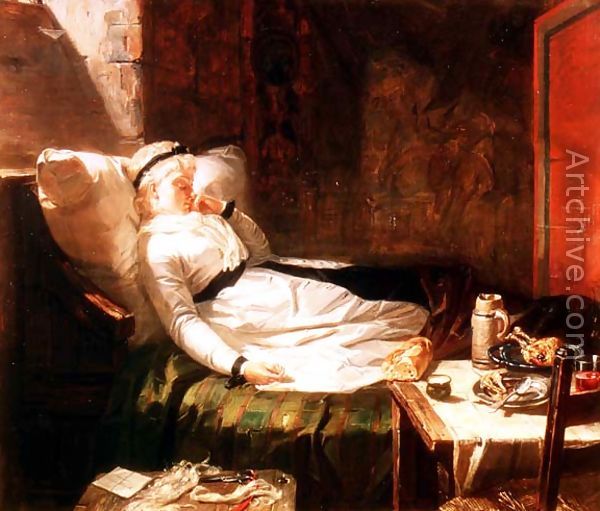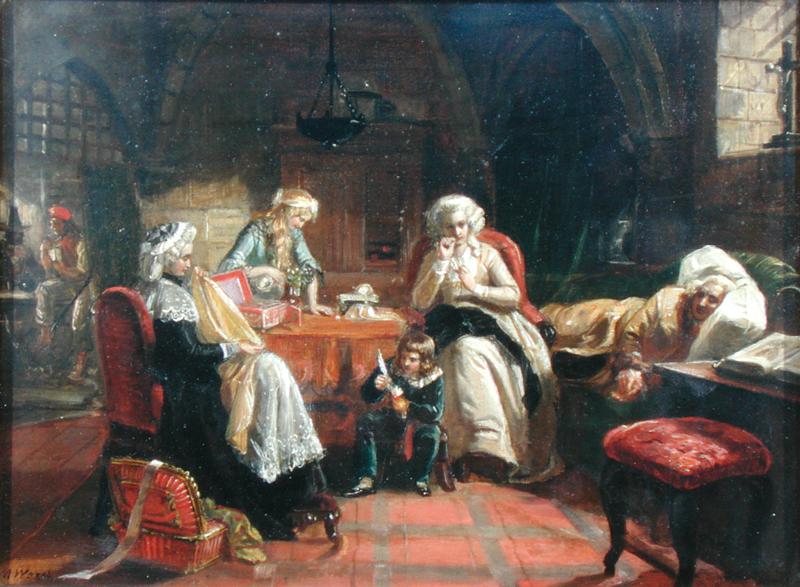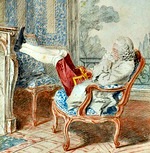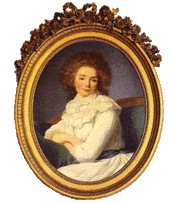Marie Antoinette et la famille royale, par Edward Matthew Ward
3 participants
LE FORUM DE MARIE-ANTOINETTE :: Les portraits de Marie-Antoinette :: Portraits de Marie-Antoinette :: Les peintures et les dessins :: Autres peintres et artistes
Page 1 sur 1
 Marie Antoinette et la famille royale, par Edward Matthew Ward
Marie Antoinette et la famille royale, par Edward Matthew Ward
Edward Matthew Ward (1816-1879), peintre est un peintre anglais, actif durant le règne de Victoria, et célèbre notamment pour ses peintures « historiques ».
Deux versions de la séparation du Dauphin d’avec sa famille, au Temple :

Et en vente le, 11 décembre 2014, chez Christie's Londres, ce tableau d'Edward Matthew Ward, R.A. (1816-1879) intitulé "The Last Parting of Marie Antoinette and her Son" :

Notice :
Edward Matthew Ward, R.A. (1816-1879)
The Last Parting of Marie Antoinette and her Son
signed and dated 'E M Ward. RA/1856' (lower left)
oil on canvas
48 ¼ x 71 ¾ in. (122.4 x 182.1 cm.)
In the early years of Victoria’s reign there was a great taste for collecting literary and historical subjects. Mulready, Egg and Leslie all painted them, but perhaps the greatest exponent of the genre was Edward Matthew Ward. To his adoring public he bought novels and history to life, through carefully staged tableaux, and painstaking care in painting historically accurate costume, and selecting suitable accompanying 'effects’. His pictures can be thought of as proto-cinematic, such is the ease with which the narrative can be read through the facial expressions of the protagonists.


Ward was born in Pimlico, and evidently showed talent in his draughtsmanship from an early age as he was encouraged in his artistic studies by Chantrey and Wilkie who sponsored his admission to the RA schools in 1835 at the age of nineteen. Between 1836 and 1839 Ward studied in Rome and won a silver medal at the Academy of St Luke for his historical compositions, which he pursued throughout his career.
On his return to London he entered the Westminster Hall competitions to provide designs for decorative schemes for the new building and in 1852 he was commissioned to paint eight subjects of English eighteenth-century history in the House of Commons.
Clearly influenced by Paul Delaroche’s historic masterpieces such as The Execution of Lady Jane Grey (Royal Academy, 1834), Ward enjoyed the most success in depicting scenes from the French Revolution.
Works of the 1850s by Ward and Delaroche illustrate the narrative chronologically: in 1851 Ward exhibited The French royal family during their confinement in the Temple at the Royal Academy, then in 1853 Delaroche exhibited Marie-Antoinette before the tribunal.
The present work was exhibited at the Royal Academy in 1856.


The French Revolution had a great influence on British intellectual, philosophical and political life in nineteenth-century Britain. Many accounts of the ill-fated court existed in the 1850s, but Ward’s probable source was a biography of Louis XVII by Alcide de Beauchesne, published in 1855.
Ward has carefully illustrated the scene, showing the Queen and her sister-in-law, Madame Elizabeth, who have been mending clothes, and the Princess Marie-Thérèse who has just opened her prayer book, with six Revolutionary officials who have just entered the room to inform the queen that her son is to be taken away from her: ‘[She] drew her son before her, laid her two hands on his little shoulders, and calm, motionless, and composed in her distress, without shedding a tear, or heaving a sigh, she said to him in a sad and solemn tone: ‘My child we are about to part.
Remember your duty when I am no longer present to remind you of them; never forget the merciful God who has appointed you this trial, as your mother, who loves you…’ she said, kissed her son on the forehead, and gave him in charge to the jailers’ (Beauchesne, 1853, p. 63).

Contemporary critics were highly complimentary about the work after its debut at the Royal Academy.
The Art Journal’s review said ‘We cannot too highly praise the dispositions; the composition is not thronged with useless material; every object has its voice in the story.
Upon the whole, we think, it cannot fail to be pronounced the best of the pictures which the artist has executed upon the history of these ‘unfortunates’’.
Other critics commented that it was ‘one of the artist’s greatest works’ (Daily News, 3 May 1856, p. 2), and ‘one of the best and most popular of his pictures’ (Redgrave, 1947, p. 473), and another commentator claimed never to have seen ‘a more deeply affecting picture’ (Bentley’s Miscellany, 1856, p. 488).
 Toujours dans la même veine, on lui doit aussi...
Toujours dans la même veine, on lui doit aussi...
Marie-Antoinette dans sa cellule à la Conciergerie :

La lecture de l'acte d'accusation à la reine :

La famille royale au Temple :

Et deux déclinaisons d’après le même artiste :


Ainsi que cette surprenante orpheline du Temple :

Deux versions de la séparation du Dauphin d’avec sa famille, au Temple :

Et en vente le, 11 décembre 2014, chez Christie's Londres, ce tableau d'Edward Matthew Ward, R.A. (1816-1879) intitulé "The Last Parting of Marie Antoinette and her Son" :

Notice :
Edward Matthew Ward, R.A. (1816-1879)
The Last Parting of Marie Antoinette and her Son
signed and dated 'E M Ward. RA/1856' (lower left)
oil on canvas
48 ¼ x 71 ¾ in. (122.4 x 182.1 cm.)
In the early years of Victoria’s reign there was a great taste for collecting literary and historical subjects. Mulready, Egg and Leslie all painted them, but perhaps the greatest exponent of the genre was Edward Matthew Ward. To his adoring public he bought novels and history to life, through carefully staged tableaux, and painstaking care in painting historically accurate costume, and selecting suitable accompanying 'effects’. His pictures can be thought of as proto-cinematic, such is the ease with which the narrative can be read through the facial expressions of the protagonists.


Ward was born in Pimlico, and evidently showed talent in his draughtsmanship from an early age as he was encouraged in his artistic studies by Chantrey and Wilkie who sponsored his admission to the RA schools in 1835 at the age of nineteen. Between 1836 and 1839 Ward studied in Rome and won a silver medal at the Academy of St Luke for his historical compositions, which he pursued throughout his career.
On his return to London he entered the Westminster Hall competitions to provide designs for decorative schemes for the new building and in 1852 he was commissioned to paint eight subjects of English eighteenth-century history in the House of Commons.
Clearly influenced by Paul Delaroche’s historic masterpieces such as The Execution of Lady Jane Grey (Royal Academy, 1834), Ward enjoyed the most success in depicting scenes from the French Revolution.
Works of the 1850s by Ward and Delaroche illustrate the narrative chronologically: in 1851 Ward exhibited The French royal family during their confinement in the Temple at the Royal Academy, then in 1853 Delaroche exhibited Marie-Antoinette before the tribunal.
The present work was exhibited at the Royal Academy in 1856.


The French Revolution had a great influence on British intellectual, philosophical and political life in nineteenth-century Britain. Many accounts of the ill-fated court existed in the 1850s, but Ward’s probable source was a biography of Louis XVII by Alcide de Beauchesne, published in 1855.
Ward has carefully illustrated the scene, showing the Queen and her sister-in-law, Madame Elizabeth, who have been mending clothes, and the Princess Marie-Thérèse who has just opened her prayer book, with six Revolutionary officials who have just entered the room to inform the queen that her son is to be taken away from her: ‘[She] drew her son before her, laid her two hands on his little shoulders, and calm, motionless, and composed in her distress, without shedding a tear, or heaving a sigh, she said to him in a sad and solemn tone: ‘My child we are about to part.
Remember your duty when I am no longer present to remind you of them; never forget the merciful God who has appointed you this trial, as your mother, who loves you…’ she said, kissed her son on the forehead, and gave him in charge to the jailers’ (Beauchesne, 1853, p. 63).

Contemporary critics were highly complimentary about the work after its debut at the Royal Academy.
The Art Journal’s review said ‘We cannot too highly praise the dispositions; the composition is not thronged with useless material; every object has its voice in the story.
Upon the whole, we think, it cannot fail to be pronounced the best of the pictures which the artist has executed upon the history of these ‘unfortunates’’.
Other critics commented that it was ‘one of the artist’s greatest works’ (Daily News, 3 May 1856, p. 2), and ‘one of the best and most popular of his pictures’ (Redgrave, 1947, p. 473), and another commentator claimed never to have seen ‘a more deeply affecting picture’ (Bentley’s Miscellany, 1856, p. 488).
Marie-Antoinette dans sa cellule à la Conciergerie :

La lecture de l'acte d'accusation à la reine :

La famille royale au Temple :

Et deux déclinaisons d’après le même artiste :


Ainsi que cette surprenante orpheline du Temple :

Dernière édition par La nuit, la neige le Jeu 22 Nov 2018, 23:00, édité 2 fois

La nuit, la neige- Messages : 18133
Date d'inscription : 21/12/2013
 Re: Marie Antoinette et la famille royale, par Edward Matthew Ward
Re: Marie Antoinette et la famille royale, par Edward Matthew Ward
On s'y croirait ! Ca fait froid dans le dos ! C'est très expressif !
Emouvant.
Emouvant.
_________________


Comtesse Diane- Messages : 7397
Date d'inscription : 21/12/2013
Localisation : TOURAINE
 Re: Marie Antoinette et la famille royale, par Edward Matthew Ward
Re: Marie Antoinette et la famille royale, par Edward Matthew Ward
Une jolie peinture, inédite ici ; et pour un sujet tout compte fait assez peu illustré...
Prochainement en vente aux enchères, chez Christie's Londres :
The return from flight
Edward Matthew Ward, R.A. (1816-1879)
1872
Signed and dated 'E.M. Ward R.A./1872' (lower left) and further signed, inscribed and numbered 'No 1/E M Ward RA/1 Lansdowne/ Road/Kensington/Park' (on the reverse of the frame, upper left corner)
Oil on canvas - 45 3/8 x 52 3/8 in. (115.3 x 133 cm.)

Photo : Christie's
Note :
The return from flight : Louis XVI, Marie Antoinette, the Dauphin, Dauphiness, and Princess Elizabeth insulted by the mob on their road back to Paris after their interception at Varennes by the postmaster Drouet.
* Source et informations complémentaires : Chrisie's - British Art : Victorian, Pre Raphaelite & British Impressionist Art

Photo : Christie's

Photo : Christie's

Photo : Christie's
Prochainement en vente aux enchères, chez Christie's Londres :
The return from flight
Edward Matthew Ward, R.A. (1816-1879)
1872
Signed and dated 'E.M. Ward R.A./1872' (lower left) and further signed, inscribed and numbered 'No 1/E M Ward RA/1 Lansdowne/ Road/Kensington/Park' (on the reverse of the frame, upper left corner)
Oil on canvas - 45 3/8 x 52 3/8 in. (115.3 x 133 cm.)

Photo : Christie's
Note :
The return from flight : Louis XVI, Marie Antoinette, the Dauphin, Dauphiness, and Princess Elizabeth insulted by the mob on their road back to Paris after their interception at Varennes by the postmaster Drouet.
* Source et informations complémentaires : Chrisie's - British Art : Victorian, Pre Raphaelite & British Impressionist Art

Photo : Christie's

Photo : Christie's

Photo : Christie's

La nuit, la neige- Messages : 18133
Date d'inscription : 21/12/2013
 Re: Marie Antoinette et la famille royale, par Edward Matthew Ward
Re: Marie Antoinette et la famille royale, par Edward Matthew Ward
Merci, cher ami, pour cet inédit . Les visages reflètent peur ou lassitude. Seul le petit dort comme un ange.
_________________
... demain est un autre jour .

Mme de Sabran- Messages : 55497
Date d'inscription : 21/12/2013
Localisation : l'Ouest sauvage
 Re: Marie Antoinette et la famille royale, par Edward Matthew Ward
Re: Marie Antoinette et la famille royale, par Edward Matthew Ward
Mme de Tourzel, en face de Louis XVI , et à sa gauche, qui crois-tu ?
_________________
... demain est un autre jour .

Mme de Sabran- Messages : 55497
Date d'inscription : 21/12/2013
Localisation : l'Ouest sauvage
 Re: Marie Antoinette et la famille royale, par Edward Matthew Ward
Re: Marie Antoinette et la famille royale, par Edward Matthew Ward
Si tu m'autorises une petite digression .

Edward Matthew Ward a été très ému et inspiré aussi par le sort de Charlotte Corday.
Voir notre sujet :
https://marie-antoinette.forumactif.org/t3310-charlotte-corday?highlight=CORDAY
_________________
... demain est un autre jour .

Mme de Sabran- Messages : 55497
Date d'inscription : 21/12/2013
Localisation : l'Ouest sauvage
 Sujets similaires
Sujets similaires» Portraits de Marie-Antoinette et de la famille royale, par Jean-Martial Frédou
» Marie-Antoinette, la famille royale, et la Révolution. Par Ernst Meisel
» Marie-Antoinette et la famille royale : la collection d'Alain Bancel
» Portraits de Marie-Antoinette et de la famille royale par Charles Le Clercq ou Leclerq
» Exposition aux Archives nationales : Louis XVI, Marie-Antoinette et la Révolution, la famille royale aux Tuileries
» Marie-Antoinette, la famille royale, et la Révolution. Par Ernst Meisel
» Marie-Antoinette et la famille royale : la collection d'Alain Bancel
» Portraits de Marie-Antoinette et de la famille royale par Charles Le Clercq ou Leclerq
» Exposition aux Archives nationales : Louis XVI, Marie-Antoinette et la Révolution, la famille royale aux Tuileries
LE FORUM DE MARIE-ANTOINETTE :: Les portraits de Marie-Antoinette :: Portraits de Marie-Antoinette :: Les peintures et les dessins :: Autres peintres et artistes
Page 1 sur 1
Permission de ce forum:
Vous ne pouvez pas répondre aux sujets dans ce forum